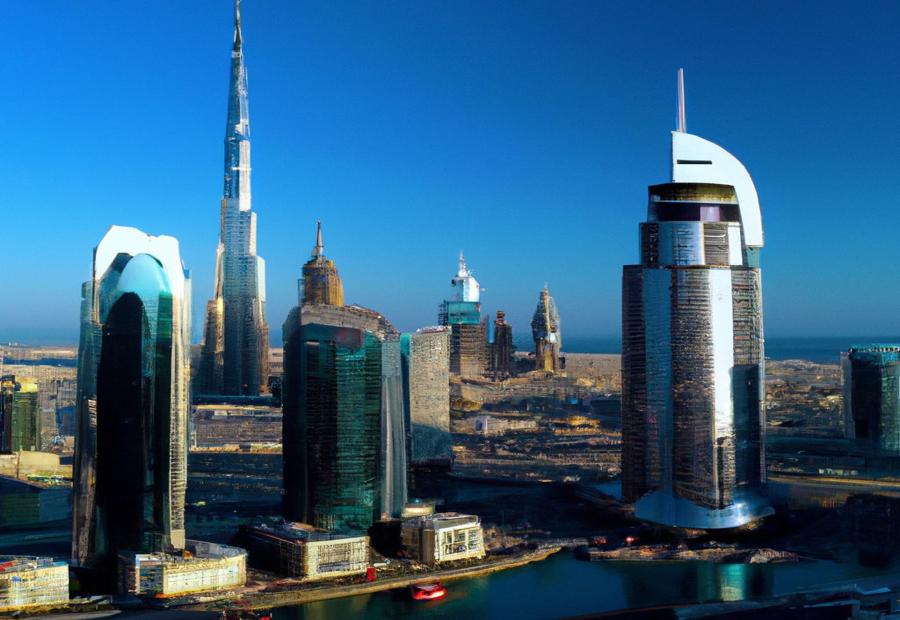- July 30, 2023
- Posted by: DBS
- Category: Uncategorized

Dubai, one of the top business destinations in the world, offers a lucrative and dynamic environment for entrepreneurs and companies looking to establish their presence. However, before diving into the process of business setup in Dubai, it is essential to understand the associated costs involved.
Setting up a business in Dubai requires adherence to legal requirements and understanding the different types of company structures available. Legal requirements include company registration, obtaining a trade license, and acquiring local sponsorship.
There are three main types of business setups in Dubai: mainland company, free zone company, and offshore company. Each type has its own set of regulations and costs associated with it.
Several factors affect business setup costs in Dubai, such as the type of business setup, office space costs, license fees, sponsorship fees, and visa costs. These costs can vary depending on the nature and size of the business.
It is crucial to have a clear understanding of the cost breakdown of business setup in Dubai, including initial setup costs and ongoing operational costs. By having a comprehensive view of these expenses, entrepreneurs can better plan and manage their budgets.
To reduce business setup costs, there are several tips and strategies that individuals can employ, such as conducting thorough market research, exploring different office space options, and leveraging cost-effective sponsorship solutions.
Understanding the various aspects of business setup costs in Dubai is essential for entrepreneurs and companies looking to establish a successful business in this vibrant city. By being aware of the expenses involved and implementing cost-saving measures, businesses can optimize their operations and thrive in the competitive market of Dubai.
Legal Requirements for Business Setup in Dubai
Legal requirements for setting up a business in Dubai can seem daunting at first, but understanding the essentials is key. In this section, we’ll dive into the crucial aspects such as company registration, trade license, and local sponsorship. Each sub-section will shed light on the necessary steps and regulations involved in navigating the business landscape of Dubai. So, if you’re looking to establish your presence in this thriving hub, fasten your seatbelts and get ready to unravel the legal requirements.
Company Registration
Company registration is a crucial step in the process of setting up a business in Dubai. It involves officially registering your company registration with the relevant government authorities. Here are some important points to consider:
- Choose a business name: Select a unique and appropriate name for your company that complies with the guidelines provided by the Department of Economic Development (DED).
- Choose a legal structure: Determine the legal structure of your company, whether it will be a sole proprietorship, partnership, or a limited liability company (LLC).
- Prepare the required documents: Gather all the necessary documents such as Passport copies of shareholders, bank reference letters, and a no-objection certificate if applicable.
- Submit the application: Submit your application for company registration along with the required documents to the DED.
- Pay the registration fee: Pay the registration fee, which is typically based on the legal structure and type of business activity.
Once your application is approved and the necessary fees are paid, you will receive a trade license and a certificate of incorporation, indicating the successful company registration of your company.
Fact: The DED is the primary government body responsible for company registration in Dubai and plays a crucial role in facilitating business growth and development in the region.
Trade License
A trade license is a necessary legal requirement for conducting business in Dubai.
By obtaining a trade license, a company gains the authority to engage in commercial activities.
The process of acquiring a trade license involves submitting the required documents and fulfilling specific criteria.
In Dubai, trade licenses are issued by either the Department of Economic Development (DED) or free zone authorities.
The fees for obtaining a trade license may vary depending on the nature of the business and the applicable jurisdiction.
Every year, it is mandatory to renew the trade license, and failure to do so can result in penalties.
A trade license permits businesses to operate within the specifically mentioned scope of activities in the license.
For certain activities like food establishments or medical services, additional permits and approvals may be needed alongside the trade license.
If necessary, a trade license can be modified or amended to include new activities or branches.
Non-compliance with the terms and conditions of the trade license can lead to fines or even the revocation of the license.
Local Sponsorship
Local sponsorship is a requirement for business setup in Dubai.
The role of the local sponsor, who must be a UAE national or a company wholly owned by UAE nationals, is to provide local support and guidance for the business.
The sponsorship agreement determines the percentage of ownership the sponsor may have in the business, which is determined by mutual agreement.
Trust and cooperation form the basis of the relationship between the sponsor and the business, with the sponsor not having the right to interfere in day-to-day operations.
Choosing a reliable and trustworthy sponsor with a good understanding of the industry is important, as they can provide necessary support.
Local sponsorship fees vary depending on the agreement and the type of business setup, but working with a reputable sponsorship service provider can ensure a smooth and transparent process.
To have a successful business setup in Dubai, it is crucial to comply with local sponsorship rules and regulations.
Types of Business Setup in Dubai

Dubai offers a diverse range of options for setting up a business, each with its own unique advantages. In this section, we’ll explore the various types of business setups available in Dubai. From mainland companies that allow for local market access to free zone companies with specialized facilities, and offshore companies that offer tax benefits, we’ll dive into the different opportunities that entrepreneurs have at their disposal. So, whether you’re looking to establish your business in Dubai’s bustling city center or prefer the flexibility of a free zone, there’s a suitable option for every aspiring entrepreneur.
Mainland Company
A mainland company in Dubai is a type of business setup that allows for activities to be conducted anywhere in the city without any geographical restrictions. This type of company requires a local UAE sponsor or partner who holds at least 51% ownership, while the foreign investor holds the remaining 49%. This partnership ensures compliance with local regulations and facilitates business operations in mainland Dubai.
One advantage of setting up a mainland company is the ability to engage in business activities with the local market. This allows for greater opportunities for growth and expansion. Additionally, mainland companies have access to a larger talent pool as they can hire both local and international employees.
However, it’s important to note that certain business activities require additional approvals from specific government authorities. For example, businesses in the healthcare, media, education, and legal sectors may need additional licenses or permits from the respective regulatory bodies.
To illustrate the benefits of a mainland company setup, consider the case of XYZ, a technology company that wanted to establish a presence in Dubai. By setting up a mainland company, XYZ was able to tap into the local market and secure partnerships with local businesses. This allowed them to gain a strong foothold in the region and achieve significant business growth.
Free Zone Company
A Free Zone Company, also known as a business setup in Dubai, refers to a type of establishment operating within a designated free zone area. These zones are specifically designed to attract foreign investment and provide various incentives and benefits to businesses.
One of the significant advantages of operating a Free Zone Company is that it allows complete control and decision-making power to the business owner as it permits 100% foreign ownership. Another benefit is the exemption from corporate and personal income taxes, customs duties, and restrictions on currency movements for companies operating in free zones. These advantages make it an extremely attractive option for international businesses looking to establish a presence in Dubai.
To successfully set up a Free Zone Company, several key requirements need to be fulfilled. These typically include the submission of necessary documentation such as a business plan, proof of address, and passport copies of shareholders. Additionally, companies are usually obliged to rent office space within the designated free zone area.
When considering the establishment of a Free Zone Company, thorough research is crucial to choose the specific free zone that aligns with your business needs. Each free zone may have different regulations, benefits, and costs associated with setting up and operating a business.
Offshore Company
When considering setting up a business in Dubai, one of the options available is an offshore company. Here are some key points to consider:
- An offshore company is a business entity that is registered and operates outside of the jurisdiction where its owners reside.
- Offshore companies in Dubai are mainly established in offshore free zones, such as Jebel Ali Free Zone, Ras Al Khaimah Economic Zone, or the Dubai International Financial Centre.
- Offshore companies enjoy various benefits, including 100% ownership for foreign investors, no requirement for a local sponsor or local office, and exemption from corporate and income taxes.
- Offshore companies are commonly used for holding assets, international trading, and as a vehicle for managing investments and intellectual property.
- While offshore companies offer convenience and flexibility, they are restricted from conducting business within the United Arab Emirates (UAE). This means they cannot engage in any commercial activities within the country.
When considering business setup in Dubai, it is essential to assess the options available and select the most suitable type of company for your specific requirements. An offshore company may be the right choice if you aim to maintain privacy, hold assets, or conduct international business without the need for a physical presence in the UAE.
Factors Affecting Business Setup Costs

Photo Credits: Www.Dubaibusinessservices.Com by Sean Walker
Setting up a business in Dubai involves various factors that directly impact the overall costs. In this section, we’ll dive into the key elements that influence these expenses. We’ll explore the different types of business setups available, examine the costs associated with acquiring office space, licenses, sponsorship, and visas. By understanding these crucial components, entrepreneurs can make informed decisions and plan strategically for their business ventures in Dubai.
Type of Business Setup
When considering setting up a business in Dubai, it is important to take into account the three main types of business setups available: Mainland Company, Free Zone Company, and Offshore Company.
| Mainland Company | A Mainland Company allows for conducting business anywhere within the Emirate of Dubai and also allows for trading in the local UAE market. |
| Free Zone Company | A Free Zone Company offers 100% foreign ownership and provides various incentives such as tax exemptions and simplified procedures. |
| Offshore Company | An Offshore Company is not permitted to conduct business within the UAE, but it is an excellent choice for international trading, holding assets, and tax optimization. |
Choosing the right type of setup is crucial, depending on the nature of your business and objectives. Mainland Companies are ideal for businesses targeting the local market, while Free Zone Companies offer benefits for businesses focused on international trade. Offshore Companies are suitable for those seeking asset protection and international exposure.
Before finalizing the type of business setup, it is advisable to carefully consider your business goals, target market, and the advantages each type offers. Consulting with a professional advisor can help you make an informed decision and optimize your business setup process in Dubai.
Office Space Costs
When considering the cost of setting up a business in Dubai, office space costs are an important factor to consider. Below is a breakdown of the office space costs for business setup in Dubai:
| Office Space Costs for Business Setup in Dubai | Cost Range |
| 1. Co-working Spaces | Starting from $200 per month |
| 2. Business Centers | Starting from $2,000 per month |
| 3. Serviced Offices | Starting from $3,000 per month |
| 4. Custom Office Spaces | Starting from $5,000 per month |
Co-working spaces are a cost-effective option for startups and small businesses, providing flexible workspaces and amenities at affordable prices. Business centers offer more professional spaces, with additional services available at higher costs. Serviced offices provide fully furnished and equipped spaces with additional services included. Custom office spaces are tailored to specific business needs, offering complete control and customization at a higher price range.
It’s essential to consider your budget, business requirements, and future growth when selecting an office space in Dubai. The cost of office space may vary depending on the location, size, and additional services provided. It’s advisable to research and compare different options to find the best fit for your business.
License Fees
License fees are an essential expense when establishing a business in Dubai.
The amount of license fees is determined by the chosen type of business setup.
For a mainland company in Dubai, the license fees can vary between AED 10,000 and AED 50,000.
For a free zone company, the license fees can range from AED 15,000 to AED 50,000.
For an offshore company, the license fees can vary between AED 10,000 and AED 30,000.
These fees are paid annually and are necessary for legal authorization of the business.
The license fees cover the expenses associated with obtaining the required permits and approvals for the business.
Specific activities or industries may incur additional fees.
It is crucial to include license fees in the budget when calculating the overall cost of establishing a business in Dubai.
Sponsorship Fees
Sponsorship Fees
Varies depending on the type of business setup and local sponsorship requirements. For a mainland company, sponsorship fees can range from 10,000 to 50,000 AED per year. Free zone companies usually require an annual fee for the sponsorship services provided by the free zone authority, which can range from 5,000 to 20,000 AED. Offshore companies typically do not require local sponsorship, therefore no sponsorship fees are applicable.
In recent years, Dubai has become an increasingly popular destination for business setup, attracting entrepreneurs from around the world. When considering the establishment of a business in Dubai, it is important to understand the various costs involved. One of these costs is sponsorship fees, which vary depending on the type of business setup required.
For mainland companies, which operate outside of the designated free zones, local sponsorship is mandatory. This means that a local sponsor, who is a UAE national or a UAE-owned company, must own a certain percentage of the business and act as a sponsor. The sponsorship fees for a mainland company can range from 10,000 to 50,000 AED per year, depending on the agreement with the sponsor.
Free zone companies, on the other hand, usually have the option to avail of the sponsorship services provided by the free zone authority. These services include the provision of a local sponsor, who will act as the sponsor for the company. The annual sponsorship fees for free zone companies can range from 5,000 to 20,000 AED, depending on the specific free zone and the services provided.
For offshore companies, which are primarily used for international business activities, local sponsorship is not required. Therefore, no sponsorship fees are applicable for offshore companies.
Understanding the sponsorship fees associated with different types of business setup in Dubai is crucial for planning and budgeting purposes. By carefully considering these costs, entrepreneurs can make informed decisions and ensure the successful establishment of their business in Dubai.
Visa Costs
The table below provides an overview of visa costs for business setup in Dubai:
| Visa Type | Cost (AED) |
| Investor Visa | 3,000 – 4,000 |
| Employment Visa | 3,000 – 5,000 |
| Dependent Visa | 1,000 – 2,000 (per dependent) |
| Maid Visa | 2,000 – 3,000 (including deposit) |
These visa costs are approximate and can vary depending on several factors, such as the duration of the visa, nationality, and any additional services or requirements. It is important to consider these Visa Costs while planning your business setup in Dubai to ensure you have a clear understanding of the expenses involved.
Cost Breakdown of Business Setup in Dubai

Photo Credits: Www.Dubaibusinessservices.Com by Walter Thomas
Dubai, the business hub of the Middle East, is attracting entrepreneurs from around the globe. If you’re considering setting up your business in this vibrant city, understanding the cost breakdown is essential. In this section, we’ll dive into the nitty-gritty details of the expenses you’ll encounter. From initial setup costs that lay the foundation for your venture to ongoing operational costs that keep the wheels turning, we’ll uncover the financial landscape of business setup in Dubai. Get ready to navigate the journey of numbers and investments with us.
Initial Setup Costs
The table below showcases the initial setup costs associated with starting a business in Dubai:
Table: Initial Setup Costs
| 1. Company Registration | $500 – $2,500 |
| 2. Trade License | $1,000 – $10,000 |
| 3. Office Space Rental | $5,000 – $50,000 per year |
| 4. Sponsorship Fees | $2,000 – $10,000 |
| 5. Visa Costs | $1,000 – $3,000 per employee |
| 6. Legal Fees | $2,000 – $5,000 |
These costs are approximate and may vary depending on several factors, including the type of business setup, office space size, and number of employees. For accurate estimates tailored to your specific business requirements, it is crucial to conduct thorough research and consult with professionals.
To minimize initial setup costs, you may consider the following suggestions:
– Opt for a smaller office space or explore shared office options to save on rental expenses.
– Evaluate different trade license options to identify the most suitable and cost-effective one for your business.
– Negotiate sponsorship fees with potential local sponsors to potentially reduce costs.
– Compare visa processing fees from different agencies to find the most competitive rates.
– Seek assistance from legal experts who can guide you through the registration process and offer potential cost-saving strategies.
Remember, careful financial planning and cost management play a vital role in ensuring a successful business setup in Dubai.
Ongoing Operational Costs
The ongoing operational costs for setting up a business in Dubai include:
- Labor costs: This includes the salaries and wages of employees. It is important to consider the minimum wage requirements set by the government and any additional benefits or allowances provided to employees.
- Rent or lease expenses: The cost of renting or leasing office or retail space is a significant ongoing expense. It may vary depending on the location and size of the premises.
- Utilities: These include electricity, water, and internet services. The cost will depend on the usage and the provider’s rates. It’s important to choose providers that offer competitive prices.
- Insurance: Businesses in Dubai are required to have insurance coverage for employees, property, and liability. The cost of insurance premiums will depend on the type of coverage and the nature of the business.
- Marketing and advertising: Promoting a business is essential for its growth and success. Ongoing expenses may include advertising campaigns, digital marketing, social media management, and other marketing activities.
- Administrative expenses: These include office supplies, communication expenses, accounting and legal fees, and other general administrative costs. It’s important to budget for these expenses to ensure smooth operations.
Strong financial management and budgeting will help businesses in Dubai to effectively manage their ongoing operational costs and ensure sustainability and profitability.
Tips to Reduce Business Setup Costs
Here are some tips to reduce business setup costs in Dubai:
First, conduct thorough research on the costs associated with different aspects of business setup, such as licensing, permits, office space, and employee visas.
Consider opting for a free zone company setup, which offers benefits such as zero taxes and full ownership for foreign investors.
Look for cost-effective office space solutions, such as co-working spaces or virtual offices, instead of renting a traditional office space.
Negotiate rental agreements and lease terms to secure the best possible rates and payment options.
Explore government incentives, grants, or subsidies that may be available to new businesses to reduce setup costs.
Use technology to streamline operations and reduce the need for expensive hardware or physical infrastructure.
Outsource certain functions or tasks to freelancers or external service providers to avoid the costs associated with hiring full-time employees.
Implement cost-effective marketing strategies, such as digital and social media marketing, instead of traditional advertising methods.
Monitor and track expenses regularly to identify areas where costs can be minimized or eliminated.
Continuously evaluate and review business processes and operations to identify opportunities for cost savings and efficiency improvements.
Frequently Asked Questions
What are the key factors that determine the business setup costs in Dubai?
The key factors that determine the business setup costs in Dubai include the type of license required (professional, commercial, or industrial), the formation costs for mainland companies or free zone companies, the office rent, the visa allocations, and the share capital requirements.
How does the cost of setting up a company in Dubai compare to other offshore jurisdictions?
The cost of setting up a company in Dubai is higher compared to other tax-free and offshore jurisdictions. For example, the cost of registering an offshore company in Dubai is approximately USD 5000, which includes various fees such as registration fee, license fee, office rent, and residence visa fee.
What are the advantages of opening a company in the UAE?
Opening a company in the UAE offers several advantages, including 0% income tax, the ability for foreign investors to own 100% of the company, a variety of business activities, 100% capital repatriation, the option to register offshore companies and trust funds for asset protection, strategic location, stable economy, and high-quality infrastructure.
What is the cost breakdown for the first year of a mainland company formation in Dubai?
The cost breakdown for the first year of a mainland company formation in Dubai starts from EURO 7950. This includes various fees such as the initial approval, final submission fee, license fees, court fees, Tasheel fee for initial approval, trade name reservation, and Ministry of Economy fees.
What are the additional costs to consider when registering a company in Dubai?
When registering a company in Dubai, additional costs to consider include fees for additional partners, market fees based on office annual rent, office rent, and foreign trade name. Other costs may include registration fees, visa payments, and bank account opening fees.
What are the advantages of setting up a free zone company in Dubai?
Setting up a free zone company in Dubai offers advantages such as value-added services and business support, a seamless company setup process, a wide range of business activities, eligibility for a corporate bank account, and the opportunity to connect with the global business community in one of the world’s most interconnected business districts.
